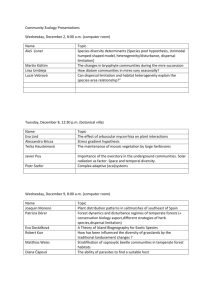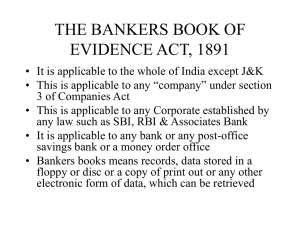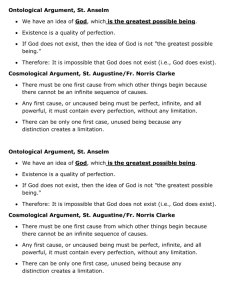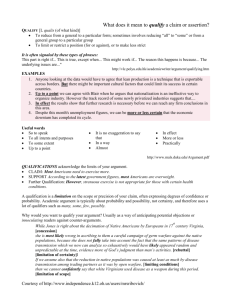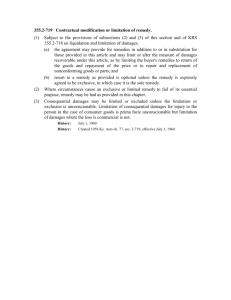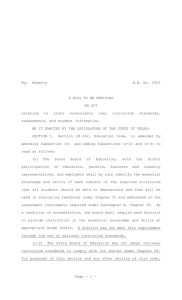Limitations Act - Queen's Printer
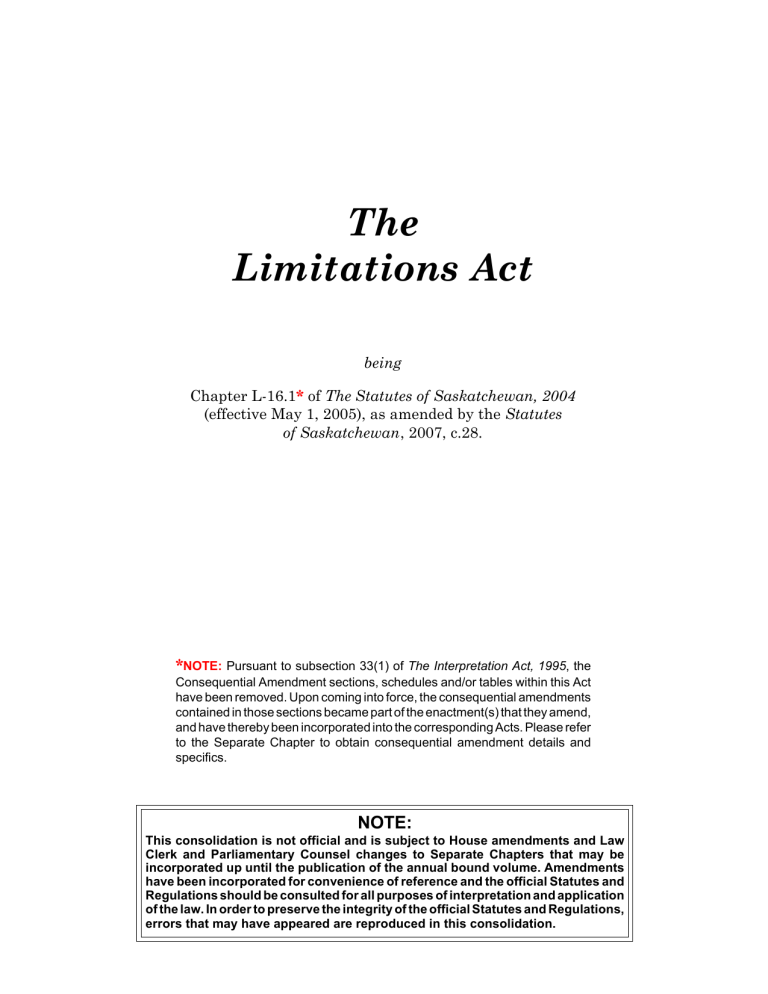
LIMITATIONS
The
Limitations Act
being
Chapter L-16.1
*
of The Statutes of Saskatchewan, 2004
(effective May 1, 2005), as amended by the Statutes of Saskatchewan , 2007, c.28.
1 c. L-16.1
*
NOTE: Pursuant to subsection 33(1) of The Interpretation Act, 1995 , the
Consequential Amendment sections, schedules and/or tables within this Act have been removed. Upon coming into force, the consequential amendments contained in those sections became part of the enactment(s) that they amend, and have thereby been incorporated into the corresponding Acts. Please refer to the Separate Chapter to obtain consequential amendment details and specifics.
NOTE:
This consolidation is not official and is subject to House amendments and Law
Clerk and Parliamentary Counsel changes to Separate Chapters that may be incorporated up until the publication of the annual bound volume. Amendments have been incorporated for convenience of reference and the official Statutes and
Regulations should be consulted for all purposes of interpretation and application of the law. In order to preserve the integrity of the official Statutes and Regulations, errors that may have appeared are reproduced in this consolidation.
2 c. L-16.1
1 Short title
2 Interpretation
PART I
Preliminary Matters
3 Application of Act
4 Crown bound
PART II
Limitation Periods
5 Basic limitation period
6 Discovery of claim
7 Ultimate limitation periods
7.1 Limitation period for judgments, orders
PART III
Rules respecting Limitation Periods in Special Circumstances
8 Persons under disability
9 Proceedings commenced by successor, principal or agent
10 Demand obligations
11 Acknowledgments and part payments
12 Certain claims against trustees
13 As against purchaser from express trustee
14 Contribution and indemnity
PART IV
Circumstances Where No Limitation Period
15 Particular proceedings
16 Assaults and sexual assaults
PART V
General Rules
17 Concealment
18 Burden of proof
19 Proceedings commenced after expiry
20 Amendment of pleadings in certain cases
21 Agreement
22 Acquiescence or laches
23 Certain variations of time limits preserved
24 Conditions precedent preserved
25 Notice periods preserved
26 Suspension of certain limitation periods
27 Conflict of laws
PART VI
Repeal and Transitional
28 R.S.S. 1978, c.L-15 repealed
29 R.S.S. 1978, c.P-40 repealed
30 13 Geo. II, c.18, (1739) repealed
31 Transitional
PART VII
Consequential and Related Amendments
32 R.S.S. 1978, c.A-6, section 14 repealed
33 S.S. 1988-89, c.A-18.02, new section 24
34 R.S.S. 1978, c.A-35 amended
35 S.S. 1984-85-86, c.B-7.1, section 19 amended
36 R.S.S. 1978, c.B-10 amended
LIMITATIONS
Table of Contents
37 S.S. 1994, c.C-4.11, section 41 repealed
38 S.S. 1994, c.C-10.1, section 47 repealed
39 S.S. 2002, c.C-11.1 amended
40 S.S. 1990-91, c.C-16.1, section 28 amended
41 R.S.S. 1978, c.C-17, section 30 amended
42 R.S.S. 1978, c.C-23 amended
43 S.S. 1996, c.C-30.1 amended
44 R.S.S. 1978, c.C-31, section 11 repealed
45 S.S. 1998, c.C-45.2 amended
46 S.S. 1982-83, c.E-9.10001, new section 7.1
47 S.S. 2002, c.E-10.21, section 15 amended
48 R.S.S. 1978, c.E-11, new section 6
49 R.S.S. 1978, c.E-16 amended
50 R.S.S. 1978, c.F-11 amended
51 S.S. 1986, c.H-3.1, new section 88
52 S.S. 1997, c.H-3.01, section 9 amended
53 R.S.S. 1978, c.L-3, section 3 amended
54 S.S. 2000, c.L-5.1, section 88 repealed
55 R.S.S. 1978, c.L-14 amended
56 S.S. 1980-81, c.M-10.1, section 72 repealed
57 S.S. 1983-84, c.M-10.2, section 25 repealed
58 S.S. 1984-85-86, c.M-13.1, new section 40
59 S.S. 1983-84, c.M-17.1, section 22.1 amended
60 R.S.S. 1978, c.N-4, section 15 repealed
61 S.S. 1999, c.N-4.001 amended
62 S.S. 1983, c.N-5.1 amended
63 R.S.S. 1978, c.O-5, section 29 repealed
64 S.S. 1984-85-86, c.O-6.1, section 50 repealed
65 R.S.S. 1978, c.O-7, section 14 repealed
66 R.S.S. 1978, c.P-3, section 84 amended
67 S.S. 1993, c.P-6.2, section 52 amended
68 R.S.S. 1978, c.P-24, section 9 repealed
69 R.S.S. 1978, c.P-31, new section 80
70 S.S. 1996, c.P-39.2, new section 79
71 S.S. 1993, c.R-13.1, section 39 repealed
72 S.S. 1983, c.R-22.01 amended
73 S.S. 1989-90, c.R-26.1 amended
74 R.S.S. 1978, c.S-4, section 17 amended
75 S.S. 1988-89, c.S-17.1, section 22 amended
76 R.S.S. 1978, c.S-26 amended
77 S.S. 1988-89, c.S-42.2 amended
78 R.S.S. 1978, c.S-52, new section 33
79 S.S. 1993, c.S-52.1, section 41 repealed
80 S.S. 1990-91, c.S-56.2, section 38 repealed
81 S.S. 1990-91, c.S-66.1, section 10 repealed
82 R.S.S. 1978, c.T-2 amended
83 R.S.S. 1978, c.T-23, section 75 amended
84 R.S.S. 1978, c.U-1, new section 8
85 S.S. 1983-84, c.U-11 amended
86 S.S. 1986-87-88, c.V-5.1, section 35 repealed
87 R.S.S. 1978, c.W-1, section 22 amended
88 R.S.S. 1978, c.W-16, section 7 amended
PART VIII
Coming into Force
89 Coming into force
LIMITATIONS
3 c. L-16.1
CHAPTER L-16.1
An Act respecting Limitation Periods for the Commencement of Civil
Proceedings, making consequential and related amendments to certain Acts and repealing certain other Acts
PART I
Preliminary Matters
Short title
1 This Act may be cited as The Limitations Act .
Interpretation
2 In this Act:
(a) “claim” means a claim to remedy an injury, loss or damage that occurred as a result of an act or omission;
(b) “claimant” means a person who has a claim;
(c) “former Act” means The Limitation of Actions Act , and includes any former Limitation of Actions Act ;
(d) “limitation period” includes any limitation period established in section 7;
(e) “mental disability” means:
(i) an intellectual disability or impairment; or
(ii) a mental disorder.
2004, c.L-16.1, s.2.
Application of Act
3 (1) Subject to subsections (2) to (5), this Act applies to claims pursued in court proceedings that:
(a) are commenced by statement of claim; or
(b) are commenced by originating notice and are not proceedings in the nature of an application.
(2) This Act does not apply to court proceedings that are:
(a) proceedings in the nature of an appeal;
(b) proceedings in the nature of a judicial review;
(c) proceedings based on existing Aboriginal and treaty rights of the
Aboriginal peoples of Canada that are recognized and affirmed in the
Constitution Act, 1982 ; or
(d) proceedings for a writ of habeas corpus.
4 c. L-16.1
LIMITATIONS
(3) Proceedings described in clause (2)(c) are governed by the laws respecting the limitation of actions that would have been in force if this Act had not been passed.
(4) This Act does not apply to a claim that is subject to a limitation provision in another Act or a regulation if that Act or regulation states that the limitation provision applies notwithstanding this Act.
(5) This Act does not apply to a claim that is subject to a limitation period in an international convention or treaty that is adopted by an Act.
2004, c.L-16.1, s.3.
Crown bound
4 This Act binds the Crown.
2004, c.L-16.1, s.4.
PART II
Limitation Periods
Basic limitation period
5 Unless otherwise provided in this Act, no proceedings shall be commenced with respect to a claim after two years from the day on which the claim is discovered.
2004, c.L-16.1, s.5.
Discovery of claim
6 (1) Unless otherwise provided in this Act and subject to subsection (2), a claim is discovered on the day on which the claimant first knew or in the circumstances ought to have known:
(a) that the injury, loss or damage had occurred;
(b) that the injury, loss or damage appeared to have been caused by or contributed to by an act or omission that is the subject of the claim;
(c) that the act or omission that is the subject of the claim appeared to be that of the person against whom the claim is made; and
(d) that, having regard to the nature of the injury, loss or damage, a proceeding would be an appropriate means to seek to remedy it.
(2) A claimant is presumed to have known of the matters mentioned in clauses (1)(a) to (d) on the day on which the act or omission on which the claim is based took place, unless the contrary is proved.
2004, c.L-16.1, s.6.
LIMITATIONS
5 c. L-16.1
Ultimate limitation periods
7 (1) Subject to subsections (2) to (4), with respect to any claim to which a limitation period applies, no proceeding shall be commenced after 15 years from the day on which the act or omission on which the claim is based took place.
(2) With respect to any claim against a purchaser of property for value acting in good faith to which a limitation period applies, no proceeding shall be commenced with respect to conversion of the property after two years from the day on which the property was converted, whether or not the limitation period has expired.
(3) Repealed.
2007, c.28, s.3.
(4) With respect to a claim based on an act or omission that causes or contributes to the death of an individual, no proceeding shall be commenced after two years from the earlier of:
(a) the day on which the death of the individual is discovered; and
(b) the day on which, by a decision of a court of competent jurisdiction, the individual is presumed to have died.
2004, c.L-16.1, s.7; 2007, c.28, s.3.
Limitation period for judgments, orders
7.1
With respect to a claim based on a judgment or order for the payment of money, no proceeding shall be commenced after 10 years from the date of the judgment or order.
2007, c.28, s.4.
PART III
Rules respecting Limitation Periods in Special Circumstances
Persons under disability
8 (1) The operation of any limitation period established by this Act or any other
Act or regulation is suspended during any period in which the claimant:
(a) is a minor; or
(b) is a person who, by reason of mental disability, is not competent to manage his or her affairs or estate and is not represented by a personal guardian or property guardian pursuant to The Public Guardian and Trustee
Act or a decision-maker pursuant to The Adult Guardianship and
Co-decision-making Act who:
(i) is aware of the claim; and
(ii) has the legal capacity to commence the proceeding on behalf of that person or the person’s estate.
(2) A claimant is presumed to have been capable of commencing a proceeding with respect to a claim at all times unless the contrary is proved.
2004, c.L-16.1, s.8.
6 c. L-16.1
LIMITATIONS
Proceedings commenced by successor, principal or agent
9 (1) In the case of a proceeding commenced by a person claiming through a predecessor in right, title or interest, the person claiming through the predecessor is deemed to have knowledge of the matters mentioned in clauses 6(1)(a) to (d) on the earlier of:
(a) the day on which the predecessor first knew or ought to have known of those matters; and
(b) the day on which the person claiming through the predecessor first knew or ought to have known of those matters.
(2) In the case of a proceeding commenced by a principal, if the agent had a duty to communicate knowledge of the matters mentioned in clauses 6(1)(a) to (d) to the principal, the principal is deemed to have knowledge of those matters on the earlier of:
(a) the day on which the agent first knew or ought to have known of those matters; and
(b) the day on which the principal first knew or ought to have known of those matters.
(3) The day on which a predecessor or agent first ought to have known of the matters mentioned in clauses 6(1)(a) to (d) is the day on which a reasonable person in the predecessor’s or agent’s circumstances and with the predecessor’s or agent’s abilities first ought to have known of them.
2004, c.L-16.1, s.9.
Demand obligations
10 Unless otherwise provided in this Act, in the case of a default in performing a demand obligation, the day on which an act or omission on which a claim is based takes place is the day on which the default occurs.
2004, c.L-16.1, s.10.
Acknowledgments and part payments
11 (1) If a person acknowledges the existence of a claim for payment of a debt, for the recovery of property, for the enforcement of a charge on property or for relief from enforcement of a charge on property, the act or omission on which the claim is based is deemed to have taken place on the day on which the acknowledgment was made.
(2) For the purposes of subsection (1), an acknowledgment:
(a) subject to subsections (3), (7) and (8), must be in writing and must be signed by the person making it or the person’s agent; and
(b) must be made, before the expiry of the limitation period applicable to the claim, to the claimant, the claimant’s agent, a receiver, a receiver-manager or an official receiver or trustee acting pursuant to the Bankruptcy and
Insolvency Act (Canada).
LIMITATIONS
7 c. L-16.1
(3) In the case of a claim for payment of a debt, part payment of the debt by the person against whom the claim is made or by the person’s agent is deemed for the purposes of subsection (1) to be an acknowledgment.
(4) Subsection (1) applies to an acknowledgment of the existence of a claim for payment of a debt even though the person making the acknowledgment refuses or does not promise to pay the debt or the balance of the debt still owing.
(5) An acknowledgment of the existence of a claim for interest is deemed for the purposes of subsection (1) to be an acknowledgment of a claim for the principal and for interest falling due after the acknowledgment is made.
(6) An acknowledgment of the existence of a claim to realize on or redeem collateral pursuant to a security agreement or to recover money with respect to the collateral is deemed for the purposes of subsection (1) to be an acknowledgment by any other person who later comes into possession of the collateral.
(7) A debtor’s performance of an obligation pursuant to a security agreement is deemed for the purposes of subsection (1) to be an acknowledgment by the debtor of the existence of a claim by the creditor for realization on the collateral pursuant to the agreement.
(8) A creditor’s acceptance of a debtor’s payment or performance of an obligation pursuant to a security agreement is deemed for the purposes of subsection (1) to be an acknowledgment by the creditor of the existence of a claim by the debtor for redemption of the collateral pursuant to the agreement.
(9) An acknowledgment by a trustee is deemed for the purposes of subsection (1) to be an acknowledgment by any other person who is or who later becomes a trustee of the same trust.
(10) An acknowledgment of the existence of a claim to recover or enforce an equitable interest in property by a person in possession of it is deemed for the purposes of subsection (1) to be an acknowledgment by any other person who later comes into possession of it.
2004, c.L-16.1, s.11; 2007, c.28, s.5.
Certain claims against trustees
12 (1) This section applies to claims:
(a) based on fraudulent breach of trust to which a trustee was a party or privy; or
(b) to recover from a trustee trust property, or the proceeds from trust property, that are in the possession of the trustee, or that were previously received by the trustee and converted to the trustee’s own use.
(2) The limitation periods established by this Act that are applicable to a claim described in subsection (1) are postponed and do not begin to run against a beneficiary until that beneficiary becomes fully aware of the fraudulent breach of trust, conversion, or other act of the trustee on which the claim is based.
2004, c.L-16.1, s.12.
8 c. L-16.1
LIMITATIONS
As against purchaser from express trustee
13 (1) This section applies to a claim of a beneficiary, or a person claiming through a beneficiary, to recover property that was vested in a trustee on an express trust and conveyed by the trustee to a purchaser for valuable consideration.
(2) For the purposes of this Act, as against the purchaser or a person claiming through the purchaser only, the day on which an act or omission on which a claim described in subsection (1) takes place is deemed to be the day on which the property was conveyed to the purchaser.
2004, c.L-16.1, s.13.
Contribution and indemnity
14 (1) In the case of a claim by one alleged wrongdoer against another for contribution and indemnity, the day on which the first alleged wrongdoer was served with the claim with respect to which contribution and indemnity is sought is deemed to be the day on which the act or omission on which that alleged wrongdoer’s claim is based took place.
(2) Subsection (1) applies whether the right to contribution and indemnity arises with respect to a tort or otherwise.
2004, c.L-16.1, s.14; 2007, c.28, s.6.
PART IV
Circumstances Where No Limitation Period
Particular proceedings
15 There is no limitation period with respect to:
(a) a proceeding for a declaration if no consequential relief is sought;
(b) subject to section 7.1, a proceeding to enforce an order of a court, or any other order that may be enforced in the same way as an order of a court;
(c) a proceeding to enforce an award in an arbitration to which The
Arbitration Act, 1992 applies;
(d) a proceeding by a debtor in possession of collateral to redeem it;
(e) a proceeding by a creditor in possession of collateral to realize on it; or
(f) a proceeding by the Crown to collect an unpaid fine.
2004, c.L-16.1, s.15; 2007, c.28, s.7.
LIMITATIONS
9 c. L-16.1
Assaults and sexual assaults
16 (1) There is no limitation period with respect to a claim in the nature of trespass to the person, assault or battery if:
(a) the claim is based on misconduct of a sexual nature; or
(b) at the time of the injury on which the claim is based:
(i) one of the parties who caused the injury was living with the claimant in an intimate and personal relationship; or
(ii) the claimant was in a relationship of financial, emotional, physical or other dependency with one of the parties who caused the injury.
(2) Subsection (1) applies whether or not the claimant’s right to commence the proceeding was at any time governed by a limitation period pursuant to the former
Act or any other Act.
2004, c.L-16.1, s.16.
PART V
General Rules
Concealment
17 The limitation periods established by this Act or any other Act or regulation are suspended during any time in which the person against whom the claim is made:
(a) wilfully conceals from the claimant the fact that injury, loss or damage has occurred, that it was caused by or contributed to by an act or omission or that the act or omission was that of the person against whom the claim is made; or
(b) wilfully misleads the claimant as to the appropriateness of a proceeding as a means of remedying the injury, loss or damage.
2004, c.L-16.1, s.17.
Burden of proof
18 If, in a proceeding, a limitation period is raised against a claimant, the claimant has the burden of proving that:
(a) the limitation period has not expired; or
(b) there is no limitation period that applies to the claim.
2004, c.L-16.1, s.18.
Proceedings commenced after expiry
19 If, after the commencement of a proceeding, it is established that a limitation period applicable to the claim had expired before the commencement of the proceeding, the claim is barred and the proceeding shall not be maintained.
2004, c.L-16.1, s.19.
1 0 c. L-16.1
LIMITATIONS
Amendment of pleadings in certain cases
20 Notwithstanding the expiry of a limitation period after the commencement of a proceeding, a judge may allow an amendment to the pleadings that asserts a new claim or adds or substitutes parties if:
(a) the claim asserted by the amendment, or by or against the new party, arises out of the same transaction or occurrence as the original claim; and
(b) the judge is satisfied that no party will suffer actual prejudice as a result of the amendment.
2004, c.L-16.1, s.20.
Agreement
21 (1) Subject to subsection (2), if an agreement expressly provides for the extension of a limitation period, the limitation period is altered in accordance with the agreement.
(2) Nothing in subsection (1) authorizes an agreement to extend the limitation period established by section 7.1 or the ultimate limitation period established by section 7.
2004, c.L-16.1, s.21; 2007, c.28, s.8.
Acquiescence or laches
22 Nothing in this Act precludes a court from granting a defendant immunity from liability under the equitable doctrines of acquiescence or laches, notwithstanding that the defendant would not be entitled to immunity pursuant to this Act.
2004, c.L-16.1, s.22.
Certain variations of time limits preserved
23 Unless otherwise expressly provided, nothing in this Act affects a provision in any other Act or regulation that extends, suspends or varies a limitation period or other time limit or authorizes a judge or court to extend, suspend or vary a limitation period or other time limit.
2004, c.L-16.1, s.23.
Conditions precedent preserved
24 Unless otherwise expressly provided, nothing in this Act affects a provision in any other Act or regulation that requires compliance with any requirement specified in the provision before a proceeding may be commenced.
2004, c.L-16.1, s.24.
LIMITATIONS
11 c. L-16.1
Notice periods preserved
25 (1) Unless otherwise expressly provided and subject to subsection (2), nothing in this Act affects a provision in any other Act or regulation that requires any notice to be given within a period specified in the provision.
(2) Notwithstanding any other Act or law, a claim is not barred:
(a) by the failure to give notice within a specified period or the insufficiency of a notice given if a judge or court is of the opinion that:
(i) there is reasonable excuse for the failure to give notice or the insufficiency of the notice; and
(ii) the defendant is not prejudiced in making a defence by the failure to give notice or the insufficiency of the notice; or
(b) by the failure to give a notice within a specified period in case of the death of the claimant.
2004, c.L-16.1, s.25.
Suspension of certain limitation periods
26 The limitation periods established by this Act are suspended for the time during which a stay of proceedings is in effect pursuant to the Bankruptcy and
Insolvency Act (Canada), the Companies’ Creditors Arrangement Act (Canada) or the Farm Debt Mediation Act (Canada).
2004, c.L-16.1, s.26.
Conflict of laws
27 The limitations laws of Saskatchewan shall be applied to any proceeding commenced or sought to be commenced in Saskatchewan notwithstanding that, in accordance with conflict of law rules, the claim is to be adjudicated pursuant to the substantive law of another jurisdiction.
2004, c.L-16.1, s.27.
PART VI
Repeal and Transitional
R.S.S. 1978, c.L-15 repealed
28 The Limitation of Actions Act is repealed.
2004, c.L-16.1, s.28.
R.S.S. 1978, c.P-40 repealed
29 The Public Officers’ Protection Act is repealed.
2004, c.L-16.1, s.29.
1 2 c. L-16.1
LIMITATIONS
13 Geo. II, c.18, (1739) repealed
30 The Act of the Parliament of Great Britain commonly called the Laws
Continuance Act , being 13 Geo. II, c.18 (1739), is repealed to the extent that it applies to matters within the legislative jurisdiction of Saskatchewan.
2004, c.L-16.1, s.30.
Transitional
31 (1) In this section:
(a) “effective date” means the day on which this Act comes into force;
(b) “former limitation period” means, with respect to a claim, a limitation period that applied with respect to the claim before the effective date;
(c) “new limitation period” means, with respect to a claim, a limitation period established by this Act that would apply if the claim were based on an act or omission that took place on or after the effective date.
(2) This section applies to claims:
(a) that are based on acts or omissions that took place before the effective date; and
(b) with respect to which no proceeding has been commenced before the effective date.
(3) No proceeding shall be commenced with respect to a claim if the former limitation period expired before the effective date.
(4) If there is no new limitation period with respect to a claim and the former limitation period did not expire before the effective date, this Act applies as if the act or omission had taken place on or after the effective date.
(5) If there is a new limitation period with respect to a claim and the former limitation period did not expire before the effective date:
(a) if the claim was not discovered before the effective date, this Act applies as if the act or omission had taken place on the effective date; and
(b) if the claim was discovered before the effective date, the former limitation period applies.
(6) If there is a new limitation period with respect to a claim but there was no former limitation period with respect to the claim:
(a) if the claim was not discovered before the effective date, this Act applies as if the act or omission had taken place on the effective date; and
(b) if the claim was discovered before the effective date, there is no limitation period.
(7) This section is subject to any agreement to vary or exclude a limitation period that was made before the effective date.
2004, c.L-16.1, s.31.
LIMITATIONS
13 c. L-16.1
PART VII
Consequential and Related Amendments
32 to 88 Dispensed. These sections make consequential amendments to other
Acts. The amendments have been incorporated into the corresponding Acts.
PART VIII
Coming into Force
Coming into force
89 (1) Subject to subsection (2), this Act comes into force on proclamation.
(2) If The Department of Energy and Mines Amendment Act, 2004 is not in force on the proclamation of this Act, section 46 of this Act comes into force on the day on which The Department of Energy and Mines Amendment Act, 2004 comes into force.
2004, c.L-16.1, s.89.
1 4 c. L-16.1
LIMITATIONS
R
EGINA,
S
ASKATCHEWAN
Printed by the authority of
T
HE
Q
UEEN’S
P
RINTER
Copyright©2007
